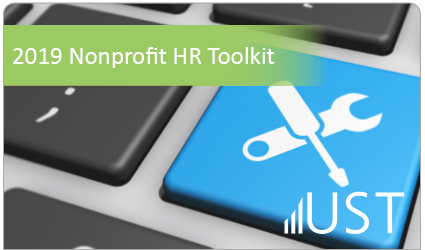
For a limited time, UST opens registration to all 501(c)(3) nonprofit executives interested in learning more about their organization’s unique tax alternative.
UST, a program dedicated to providing nonprofits with dedicated HR support and educational tools, presents an exclusive 30-minute webinar to showcase some of the most common unemployment & HR risks that can cost your nonprofit thousands of dollars annually.
UST shares insights into their many service offerings as well as best practices that can help reduce costs and streamline workforce processes.
Nonprofit executives, finance directors, and HR staff should register to learn about:
Whether your primary focus is to protect your assets, ensure compliance, reduce unemployment costs or to simply allocate more time and money to your mission-driven initiatives, this webinar can provide invaluable insight and resources that can address many of your ongoing pain points – helping you to refocus your funding and employee bandwidth on the communities you serve.
If you work for a 501(c)(3) nonprofit with 10 or more full time employees, register for the August 20th or September 18th webinar before space runs out!

This educational webinar recording outlines some of the top employee benefits trends shaping the sector this year and presents practical takeaways to inform strategy around:
For access to more learning opportunities, tips and legal updates just for nonprofits, sign up for our monthly eNews today!
Here at UST, we’ve compiled some of our top unemployment guides for managing nonprofit unemployment risk and created the 2019 Nonprofit UI Toolkit. These tools provide valuable information that can help nonprofit organizations like yours better understand the ins and outs of unemployment from the employer’s perspective.
These tools offer exclusive access to unemployment claims management tips, how-to-guides and an informative webinar recording. Plus, you can learn about best practices for unemployment compensation and the ideal approach to take when dealing with unemployment hearings.
Want access to more nonprofit how-to guides, checklists and resources? Sign up for UST’s monthly eNews!

Question: We hire interns (generally students in their junior and senior years) to do professional work for clients alongside, and under the supervision of, our professionals. They earn at least twice the salary test wage of $455 per week and are paid on a salary basis. Are they eligible for overtime pay?
Answer: Maybe. The Fair Labor Standards Act (FLSA) and state wage and hour laws exempt certain categories of employees from overtime. These interns may qualify as exempt employees under the “learned professional” employee exemption.
To meet for the learned professional employee exemption and be exempt from both minimum wage and overtime pay, all of the following criteria must be met:
See WHD Fact Sheet #17D: Exemption for Professional Employees Under the Fair Labor Standards Act (FSLA) for additional information explaining the learned professional exemption.
If the employees meet the exemption requirements, they would not be entitled to overtime. If the employees do not meet the requirements, it still may be possible that they qualify under one of the other white collar exemptions.
Q&A provided by ThinkHR, powering the UST HR Workplace for nonprofit HR teams. Get your free 30-day trial here.

When looking to hire interns to work at your nonprofit, there are multiple factors that can help determine if your organization wants to offer a paid or unpaid internship. On January 5, 2018, the U.S. Department of Labor’s Wage and Hour Division (WHD) “created new guidance for determining whether a worker could be classified as an unpaid intern under the federal Fair Labor Standards Act (FLSA).” The FLSA requires “for-profit” employers to pay employees for their work. However, this is not always the case when it comes to interns. Under the FLSA, interns may not be classified as “employees” which puts them in a situation where they don’t receive compensation for their work. With these new rules in place, employers now have more say when implementing unpaid internships.
Internships can provide highly beneficial, sought after opportunities for individuals and organizations alike, especially nonprofits. Internships give organizations unique ways to observe new talent, promote training and share resources within their community. Often interns can be college students and these internships can allow students and other individuals creative ways to grow in their intended fields, to learn valuable work skills and to develop their resumes for future success.
As a nonprofit, deciding to offer a paid internship can be a difficult decision to make, however, here are three reasons why a paid internship could be the way to go:
1) An unpaid internship could limit your pool of candidates to choose from, ruling out college students who come from lower and middle-income backgrounds. Not only are these students looking for compensation to pay for a college, they need money for everyday necessities.
2) Since interns tend to work on teams with paid employees, an unpaid internship can affect the work of those paid employees making their work feel less valued.
3) Keep in mind, when assigning projects to an unpaid intern to make sure the work isn’t something they should be compensated for – which could result in wage claims. Offering a paid internship can prevent issues like this from arising.
Bringing on interns is a great way to help those new to the workforce learn what it takes to be successful in the working world while helping nonprofits get special projects completed. Plan ahead and structure your program so that your internship program is a great experience for all those involved.

Question: Last week our offices were closed because of inclement weather. Do we need to pay our employees for the week? If not, would they be eligible for unemployment compensation?
Answer: When your business closes early, opens late, or closes for the week due to inclement weather, how you pay employees will depend on whether you have an inclement weather policy or an established practice for office closures. If you do not have a policy or practice, whether your employees are eligible for unemployment compensation depends on whether they are nonexempt or exempt. Further, whether employees would be eligible for unemployment insurance depends upon the circumstances and the particular state; employees may be able to qualify for some assistance through the state’s unemployment department.
Nonexempt employees need to be paid only for the time they have actually worked. If they have paid time off (PTO) accrued (whether vacation time or a PTO plan), then the company could deduct hours from the accrued bank to continue their pay, if the employee so desires.
If nonexempt employees come to work but are not allowed to work their full scheduled shift, a number of states impose a reporting time obligation requiring employees to be paid a minimum number of hours if they have reported for work.
However, exempt employees are paid on a salary basis and must be paid the same amount each week, regardless of the amount of work that they do. If you have a PTO plan, you can deduct from the exempt employee’s vacation or accrued time off bank to make the salary whole.
For example, management decides to send everybody home four hours into the day due to a blizzard and the offices remain closed the next day. Joe is an hourly employee in the warehouse with no accrued PTO and Mary is an exempt-level office manager with five days (40 hours) in her PTO bank. Joe would receive the four hours of pay for the day he worked and no pay for the remainder of that day or the following full day. If the company does not wish to pay Mary her entire pay for the time the office was closed, it may elect for her to receive four hours of regular pay for the time worked, and deduct from her PTO bank for 12 hours (the four hours remaining on the first day and eight hours for the next day). Mary will receive her full pay for the week.
Q&A provided by ThinkHR, powering the UST HR Workplace for nonprofit HR teams. Get your free 30-day trial here.

For a limited time, UST opens up registration to 501(c)(3) nonprofits interested in learning how to create a strong fundraising culture starting with your board members.
UST, a program dedicated to providing nonprofits with dedicated HR support and educational tools, presents an exclusive 60-minute webinar that offers an overview of the three top reasons why board members don’t fundraise and how to change their mindsets.
Join Barbara O’Reilly, CFRE, Principal of Windmill Hill Consulting, to learn the key steps you need to have in place to build your team of volunteer leaders; to train them and manage their expectations for success; and to determine the roles every board member can—and should—play in creating a strong culture of giving within your organization.
This educational webinar will teach attendees about:
If you’re a 501(c)(3) nonprofit executive with 10 or more full time employees, register for the June 25th webinar before space runs out!

UST is giving 779 nonprofits $13,655,819 in cash back for their ability to reduce their anticipated unemployment claims within the past year.
UST, a program dedicated to providing nonprofits with workforce solutions that help reduce costs so that they can focus more on their missions, announces that it will be dispersing $13,655,819.69 in cash back to more than 779 of their program participants. After accruing all of their claims savings, audited state returns and cash back throughout the last year, UST members will have $38.8 million filtered back into their nonprofits’ pockets.
These refunds are just part of how UST serves its mission of “Providing nonprofits with workforce solutions that reduce costs and strengthen their missions.” UST aims to provide 501(c)(3) nonprofits with the latest HR training, outplacement resources and unemployment claims management tools they need to stay compliant with the state and federal laws, while also helping to reduce paperwork burdens.
One of UST’s most popular programs, UST Trust, helps reimbursing employers build a reserve—protecting their money on the front end—so they don’t experience the steep ups and downs in their cash flow due to unexpected unemployment claims. Unlike their for-profit counterparts, UST Trust participants can receive cash back through UST when their organization is able to reduce their unemployment claims and still maintain a healthy reserve balance for future claims.
“The $13.6 Million we are returning to UST participants can offer their organizations the flexibility they need to execute additional mission-driven initiatives,” said Donna Groh, Executive Director of UST. “The UST team is pleased to be able to continue returning funds to our hard-working members—further supporting the communities in which they serve.”
To learn more about the UST program for 501(c)(3) employers, visit www.ChooseUST.org. If you’re a reimbursing or tax-rated nonprofit, and looking for innovative ways to save money, fill out a free Unemployment Cost Analysis form.

Here at UST we’ve put together our Top 10 Guides for 2019 Nonprofit Human Resource management. And for a limited time, we’re giving them away for FREE.
Since 1983, UST has provided nonprofits with the latest HR resources in an effort to help organizations stay compliant, maximize employee bandwidth and reduce overhead costs. This toolkit includes updated 2019 state and federal minimum wage data and recordkeeping requirements, as well as checklists to ensure compliance. Plus, you can learn the top six strategies to develop and maintain a thriving workplace.
Still have questions? You can get a free 30-day trial of UST HR Workplace powered by ThinkHR, a cloud-based service that aims to reduce HR liability through a live expert hotline, 250+ online compliance courses, compensation tools, employee handbook builders, and employee classification step-by-step guides. Set up your ThinkHR trial today!

Question: How can you determine whether a worker is an independent contractor or employee?
Answer: Generally, independent contractors are self-employed individuals who work on special projects that require no training, may work from either the employer site or another location, and do not need direction or the company’s materials to do the job. Additionally, these individuals are typically paid based on contract milestones.
Under federal “common law” rules, anyone who performs services for you is your employee if you can control what, when, and how the work will be done. This is true even if the person in question has the freedom to determine when certain work actions are taken. According to the IRS, “What matters is that you have the right to control the details of how the services are performed.”
Some states look to the federal common law rules, while others, such as Oregon, New York, and California, have their own additional tests of whether an individual is an independent contractor or employee. Many states publish fact sheets or handbooks with these guidelines to aid employers in making the appropriate classification.
The key in making this determination is to look at the entire relationship, consider the degree or extent of the right to direct and control, and finally, document each of the factors used in coming up with the determination.
In determining whether the person providing service is an employee or an independent contractor, all information that provides evidence of the degree of control and independence must be considered. In short, you will want to examine this decision carefully, so as to avoid tax consequences by misclassifying someone as an independent contractor.
Source: www.irs.gov/Businesses/Small-Businesses-&-Self-Employed/Employee-(Common-Law-Employee)
Q&A provided by ThinkHR, powering the UST HR Workplace for nonprofit HR teams. Get your free 30-day trial here.

UST maintains a secure site. This means that information we obtain from you in the process of enrolling is protected and cannot be viewed by others. Information about your agency is provided to our various service providers once you enroll in UST for the purpose of providing you with the best possible service. Your information will never be sold or rented to other entities that are not affiliated with UST. Agencies that are actively enrolled in UST are listed for review by other agencies, UST’s sponsors and potential participants, but no information specific to your agency can be reviewed by anyone not affiliated with UST and not otherwise engaged in providing services to you except as required by law or valid legal process.
Your use of this site and the provision of basic information constitute your consent for UST to use the information supplied.
UST may collect generic information about overall website traffic, and use other analytical information and tools to help us improve our website and provide the best possible information and service. As you browse UST’s website, cookies may also be placed on your computer so that we can better understand what information our visitors are most interested in, and to help direct you to other relevant information. These cookies do not collect personal information such as your name, email, postal address or phone number. To opt out of some of these cookies, click here. If you are a Twitter user, and prefer not to have Twitter ad content tailored to you, learn more here.
Further, our website may contain links to other sites. Anytime you connect to another website, their respective privacy policy will apply and UST is not responsible for the privacy practices of others.
This Privacy Policy and the Terms of Use for our site is subject to change.
UST maintains a secure site. This means that information we obtain from you in the process of enrolling is protected and cannot be viewed by others. Information about your agency is provided to our various service providers once you enroll in UST for the purpose of providing you with the best possible service. Your information will never be sold or rented to other entities that are not affiliated with UST. Agencies that are actively enrolled in UST are listed for review by other agencies, UST’s sponsors and potential participants, but no information specific to your agency can be reviewed by anyone not affiliated with UST and not otherwise engaged in providing services to you except as required by law or valid legal process.
Your use of this site and the provision of basic information constitute your consent for UST to use the information supplied.
UST may collect generic information about overall website traffic, and use other analytical information and tools to help us improve our website and provide the best possible information and service. As you browse UST’s website, cookies may also be placed on your computer so that we can better understand what information our visitors are most interested in, and to help direct you to other relevant information. These cookies do not collect personal information such as your name, email, postal address or phone number. To opt out of some of these cookies, click here. If you are a Twitter user, and prefer not to have Twitter ad content tailored to you, learn more here.
Further, our website may contain links to other sites. Anytime you connect to another website, their respective privacy policy will apply and UST is not responsible for the privacy practices of others.
This Privacy Policy and the Terms of Use for our site is subject to change.